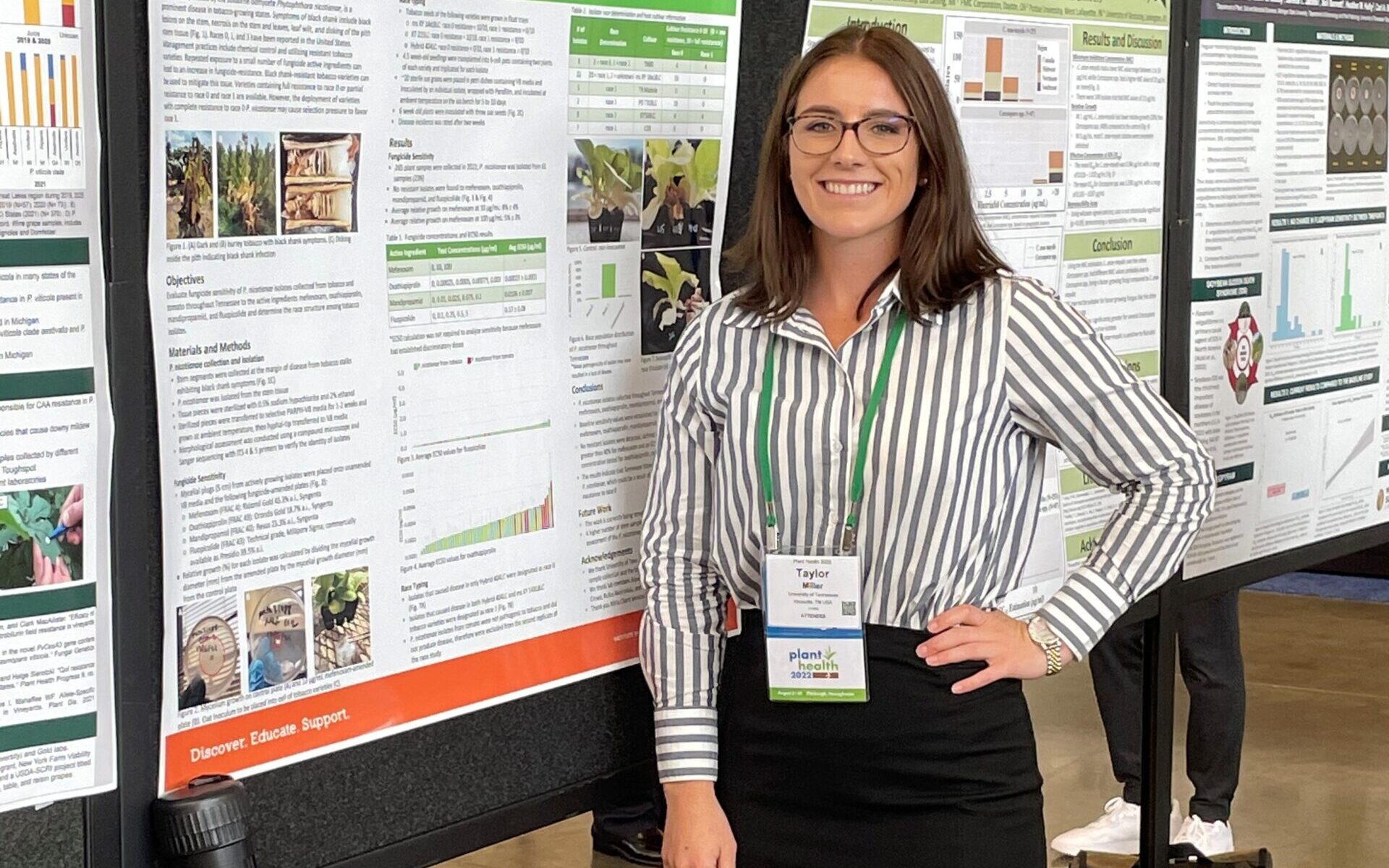
Taylor Miller began her profession in the chemical industry, developing adjuvants to improve herbicide and fungicide applications. After working in this field, Miller was inspired to seek a deeper education in plant diseases. In the fall of 2021, she arrived at the University of Tennessee to study plant pathology under the tutelage of Zach Hansen, assistant professor and Extension specialist. As a graduate student, Miller has presented her research and participated in educational events. In her free time, Miller enjoys paddle boarding, boxing, and spending time with her dog Rocky.
Q&A with Taylor Miller
Can you tell me a little bit about yourself?
I am a chemist-turned-plant pathologist graduate student with a passion for finding new solutions to ensure crops are protected from disease. My first taste of plant pathology was during my time at an adjuvant chemical company trying to find a solution to control black sigatoka (Mycosphaerella fijiensis) in banana. This inspired me to enroll in the Entomology and Plant Pathology program at the University of Tennessee to seek a deeper education in plant diseases.
What was your current research question?
One of my research questions shifted from “How pathogenic is Phytophthora nicotianae isolated from tobacco on another susceptible host, tomato?” to “What is responsible for host specificity among Phytophthora nicotianae isolates?”, which is a very complex question. P. nicotianae seems to have molecular differences, and in turn varying pathogenicity on different hosts, which is likely attributed to which host it is initially infecting and cultured from.
Can you tell me a little more about your research?
My research focuses on the pathogen Phytophthora nicotianae in tobacco and tomato. It is responsible for black shank of tobacco and buckeye rot of tomato. It is a soilborne pathogen and can continue to cause disease in fields for many years. I conducted fungicide sensitivity studies using active ingredients registered to control P. nicotianae and a race structure assessment for two consecutive years to determine the race population throughout the tobacco-growing regions of the state. The results derived from these studies provides valuable information to the grower regarding management solutions. I also conducted greenhouse and field trials to understand the pathogenicity of P. nicotianae isolated from tobacco on various tomato varieties commonly produced in Tennessee.
How has your academic training at The University of Tennessee Institute of Agriculture prepared you for a career?
My academic training at UTK has provided me with diagnostic skills for identifying diseases, as well as a comprehension of various disease cycles I will use in future employment. I gained valuable techniques, specifically PCR, DNA extraction, and selective media preparation. The fieldwork I was involved in in the Hansen lab was extremely impactful, specifically the responsibility of running and managing field trials with my lab mates and research staff, collecting samples, and communicating with growers.
What academic class has been your favorite and why?
My favorite course in the program was Mycology, taught by Dr. Bonnie Ownley, because it taught me in-depth knowledge on the Kingdom Fungi. This ranged from common pathogens in agriculture, as well as wild mushroom species we see daily. We were also provided a wonderful meal at the end of the semester, which included food and drinks produced by species we learned in the class. I also thoroughly enjoy Biopesticides taught by Dr. Kim Gwinn for opening my eyes to how there are alternative pesticides that are derived from natural substances, such as animals, plants, bacteria, and certain minerals.
What do you believe is your biggest academic achievement?
Winning the first poster competition I was a part of as a graduate student really solidified my confidence in the topics I study, as well as my public speaking skills!
Do you have any advice you would like to share with a prospective student?
Lean on your advisors, peers in your research group, and other potential mentors for help!
